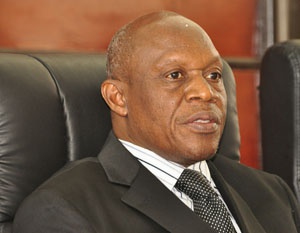The other day, Prof Paa Kwesi Mintah consigned the literary fraternity in Ghana to a dump near my village, when he described every Ghanaian writer as 2 by 4. In his typical haste to be ‘on my case’, as has become his custom, Paa Kwesi had forgotten that his Zambia-based relation, Kwesi Attah-Sekyi, a very fine gentleman I am told, belongs in that fraternity. I get to read Attah -Sekyi’s writings before they are published. I am no special to him; I just happen to be on his email list, with many others who share his beliefs and appreciates good writing. He is not 2 by 4 at all, as his cousin would want him to appear. “Onye ji onye n’ani ji onwe ya: He who will hold another down in the mud must stay in the mud to keep him down,” Achebe left this behind for all of us. Well, Paa Kwesi is not in the mud, not yet.
Last week’s issue was a tribute to a literary great and a superior talent. However affordable Christian charity may seem, I shouldn’t have any literary audacity to pen anything about Chinua Achebe or review any of his writings. He belongs in the stratosphere of excellence, literary excellence, I mean, and the world of letters forever remains impoverished at his demise. “How dare you?”, Paa Kwesi had quizzed when he read my tribute to Achebe. And he was right. I don’t know much about intellectual issues to qualify to write about Achebe; but I have the right to take part in them. Those were also Achebe’s words: “To me, being an intellectual doesn’t mean knowing about intellectual issues; it means taking pleasure in them.”
So I obeyed the Kabiesi of African literature to take pleasure in an activity that is preserved for Wole Soyinka, Wa Thiongo, Ama Ata Aidoo, Kwei Armah and maybe Prof Kwesi Paa Mintah. In that exercise, however, I sought to highlight a known problem on our continent, a problem that Prof Kwesi Mintah should be aware of by now. To the disgust of another professor, satiric poetess Akadu Mensema Ntiriwa, I wrote that not many Ghanaians know Prof Achebe beyond the seminal ‘Things Fall Apart’. I lamented the poor reading culture in Ghana and also said that many of those who may have read TFA may have done so in school when it was a prescribed text for African literature. I was also unashamed to admit that I am one of those, and that I read ‘Arrow of God’ in similar circumstances.
The commentary on that sincere information was revealing and vindicating at the same time. As typical of radio phone-in programmes where folks call in the middle of talk shows to request Borborbor songs for their friends, a few commentators assumed I had written that no Ghanaian has read TFA, and went on to pour out a few bad words on my table. Others contested my assertions, wishing away the truth about the obvious while betraying their thoughts by refusing to, at least, read to appreciate the thesis of my report. One of those fine folks didn’t understand why I would say Achebe was bigger than Africa. Yet, in a succeeding sentence, he goes on to glorify in Achebe’s record: Things Fall Apart has sold 8 million copies and has been translated into 50 languages. Then before he signs off, he makes spaghetti of the confusion, by asking whether Achebe wrote anything in his native Igbo language. Prof Mintah thought I was self-serving and obsequious.
I was even charitable when I wrote that the reading culture in Ghana is picking up. Mr Bernard Manu Afreh, a very young boy whose big brains would take him places, chided in with the truth that I had conveniently avoided. Manu was emphatic: “The reading culture is fast dying.” He drives home the awful truth: “Well, you cannot blame those who argue that informative articles are in short supply. When one analyses how banal articles are given prominence in this academic forum, one is tempted to agree more...” He, however, found the western media “condescending” by simply referring to Achebe as an African Great, and not a Global Giant.
Prof Mintah doesn’t help our cause for a more informed African generation when he plays the Tartuffe by making our intention look as bad as our intentionsity. And he should worry that we don’t have surveys or research to gauge our understanding and appreciation of things that should matter to us. He may not accept that not many of us have read Achebe’s ‘There Was A Country’, but would Paa Kwesi also accept that many postgraduate students in Ghana today may not know about ‘This Earth, My Brother’ by Kofi Awoonor? And when I say most, I am not speaking in absolute terms. It is obvious I am not speaking from any research or the latest CNN or PEW findings. I speak of these as a vicarious participant in a play whose script I saw being written and rewritten over a long period. I know the plot.
I would share a few of the events that make the plot. I showed up in my former office with a copy of ‘This Earth, My Brother’ in my hands. Prof Awoonor had been appointed Chairman of Council of Sate under Mills. Besides, he has always been known as a good academic in our part. A colleague looks at the book and wonders whether the Council of State man is the same person who penned the novel. I asked whether he had ever read it. Well, he had passed through Legon, GIMPA and University of Leicester in London. He is very literate in terms of degrees, but quite illiterate about the intellectual class in his own country. Incidentally, this is some of the rotten dunghill nation building foundations Awoonor talks about in the novel. None of the other colleagues knew about it. And for the umpteenth time, I would confess that I had read it because Awoonor’s friend, Prof Kofi Anyidoho, had recommended it in class when he casually spoke about the prose poem. I also asked about Kwei Armah’s ‘Fragments’, and Ahoy!
This was an isolated case. What is the broader case of readership in Ghana? And I am not talking about newspapers, which Mintah may find, is shockingly low. Corruption and poverty, especially in terms of GDP and economics, may be part of our sad story, but literary poverty underpins it all. I have noticed that the poverty rates in countries where grannies don’t read are usually high. I help an 80 year old to locate a comfortable spot on a public bus in Ottawa. They say a hearty ‘Thank You’ and instantly reach inside their bags for a book while I sit there watching. I look around and almost everybody around me is reading something. I scan through to see my lookalikes, and they are either chatting on phones or chewing gums noisily. When we get down to change buses, the grannies read while waiting for the next bus. I stare into space and pray or adjust the sound on my phone.
I am trying hard to develop the reading habits of these grannies. I suddenly realised that it takes a lot away from my Africanness when I haven’t read many of the African writers. By our culture, we don’t visit fellow African countries on holidays, so the best way to know about our countries is to read about them–not from white folks–but from those who lived the story. The same day Michael Jackson proposed to adopt a kid from every continent, I also pledged to read an African writer from at least 20 African countries. I wasn’t going to include countries from which I had read some authors. That project had the same prospects as the CPP in Ghanaian elections.
To make up for what Achebe calls a lazy man’s apology (procrastination), I have resolved to enrol on a course on how to write memoirs. A very important Ghanaian personality has agreed to have me write his memoirs. He appears quite comfortable with my present writing profile, but I know the School of Communication Studies at Legon didn’t teach me that. In other communication schools, it is whole discipline. We shouldn’t bother asking why none of our presidents ever wrote a bestseller. Maybe we don’t have experts to help them write their stories. It will be my only occupation if I succeed. If I don’t, I will try again until spring is born under my bright steps. Kwesi Tawiah-Benjamin is a journalist. He lives in Orleans, Ottawa.
bigfrontiers@gmail.com
Opinions of Wednesday, 27 March 2013
Columnist: Tawiah-Benjamin, Kwesi














